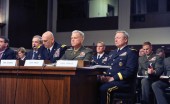Guardsmen exchange ideas on gangs and youth violence in the Caribbean
Written by Sgt. 1st Class Blair Heusdens // September 1, 2011 // Feature Stories
BRIDGETOWN, Barbados (Sept 1, 2011) – Guardsmen from the Florida National Guard and the Virgin Islands National Guard participated in a subject matter expert exchange seminar on youth and gang violence in the Caribbean, Aug. 30-31.

1st Lt. Paul O'Leary, commander of Headquarters and Headquarters Company, 1st Battalion, 124th Infantry Regiment, presents a briefing on youth violence and gang awareness during a subject matter exchange seminar in Bridgetown, Barbados, Aug. 30, 2011. Soldiers from the Florida National Guard and the Virgin Islands National Guard participated in the exchange to address youth and gang violence in the Caribbean. Photo by Sgt. 1st Class Blair Heusdens
“This is truly non-traditional military engagement in this region that was asked for specifically by each of the chiefs of defense and commissioners of police that I deal with,” said Cmdr. Ted Gangsei, the Military Liaison Officer for the U.S. Embassy of Barbados and theEastern Caribbean. “This is value back from the defense forces back into the community.”
In Barbados and across theEastern Caribbean, economic challenges have put many community programs to help at-risk youth in danger. Often, offending juveniles are put directly into the general population of the prison system, with no chance for the support or the educational assistance they might need.
“There’s been a lot of belt tightening and as a result some of the government programs that would be available to help at risk youth are just not there or those resources have to go elsewhere,” said Gangsei.
Gang violence can, in turn, have a significant impact on the economy, especially in a region that relies heavily on tourism.
“Obviously these countries rely heavily on tourism and anything that endangers that like crime and violence and youth gangs is something that’s gong to endanger their well-being economically,” said 1st Lt. Paul O’Leary, commander of Headquarters and Headquarters Company, 1st Battalion, 124th Infantry Regiment, and also a 15-year law enforcement veteran who began his police service in Hialeah, Fla.
The exchange included members of the Barbados Defence Force, the Royal Barbados Police Force and the Regional Security System in addition to the subject matter experts from theFloridaand Virgin Islands National Guards. The group discussed several factors that influence youth to join gangs and ways to prevent gangs from proliferating throughout the islands.
“The young people will always try things to try to be different,” said Sgt. Andrew Moore of the Royal Barbados Police Force. “They’re easily influenced. I think the majority of people who join gangs just want to be somebody. You will seldom see someone join a gang who has already charted their life.”

Chief Master Sgt. Neville Lee, the Virgin Islands National Guard counterdrug coordinator, discusses strategies to reduce gang violence and proliferation with members of the Regional Security System, a treaty organization for defense in the Caribbean. As part of the National Guard's State Partnership Program, Guardsmen from the Florida and Virgin Islands National Guards participated in a subject matter expert exchange addressing youth and gang violence in the Caribbean. Photo by Sgt. 1st Class Blair Heusdens
Through the National Guard’s State Partnership Program, Gangsei hopes to provide a tool for dialog between the countries of the Regional Security System (RSS), which is a treaty organization for defense that includes seven member countries – Antigua and Barbuda, Barbados, Dominica, Grenada, Saint Kitts and Nevis, Saint Lucia and Saint Vincent and the Grenadines.
“Utilizing the RSS to facilitate access to member nations’ training is the key to success,” said Gangsei.
Many of the security initiatives that the U.S. Embassy inBarbadosbrings to the local islands are not always seen by the local population. Because initiatives that address youth and gang violence affect not only the defense ministry, but other areas such as education and health, these projects will be more visible and appreciated by the community.
“In a lot of respects, most of what we do is not seen by the general population of these regions,” said Gangsei. “When we interact with programs that impact the community, it has a much wider and lasting impact.”
The subject matter experts were able to find common ground and share experiences with the law enforcement officers of the Caribbean. Because many gangs proliferate from the U.S., the Guardsmen were able to provide valuable information on known gang activities and strategies for dismantling gangs.
“Typically when you deal with law enforcement officers from other countries, you find out that we’re really not significantly different in how we conduct ourselves,” said O’Leary. “The laws are typically very, very similar and the enforcement is similar; it’s just the little nuances that are different regionally.”
The State Partnership Program gives National Guardsmen an opportunity to share valuable experiences and learn from other countries while strengthening U.S.partnerships around the world.
“The strength of the National Guard is exactly what you see here,” said O’Leary. “Most Guard members have a civilian career and bring a wide spectrum of expertise to the table that you might not find with active duty military. Operations like this give us an opportunity to tap into those different backgrounds and expertise and use them to our advantage.”
###















